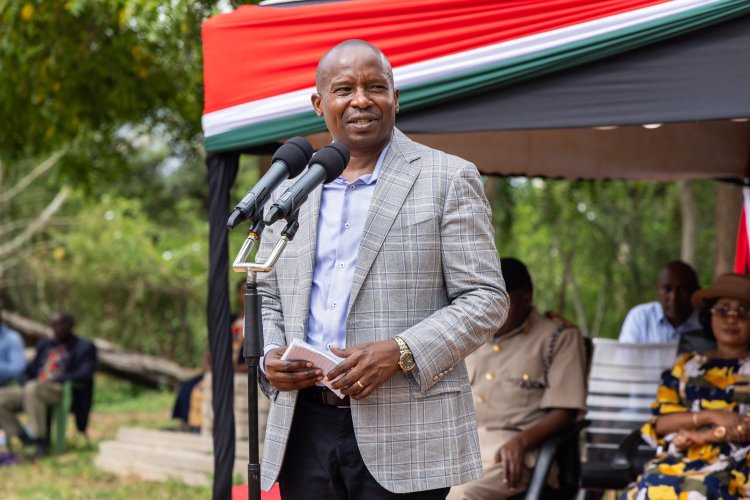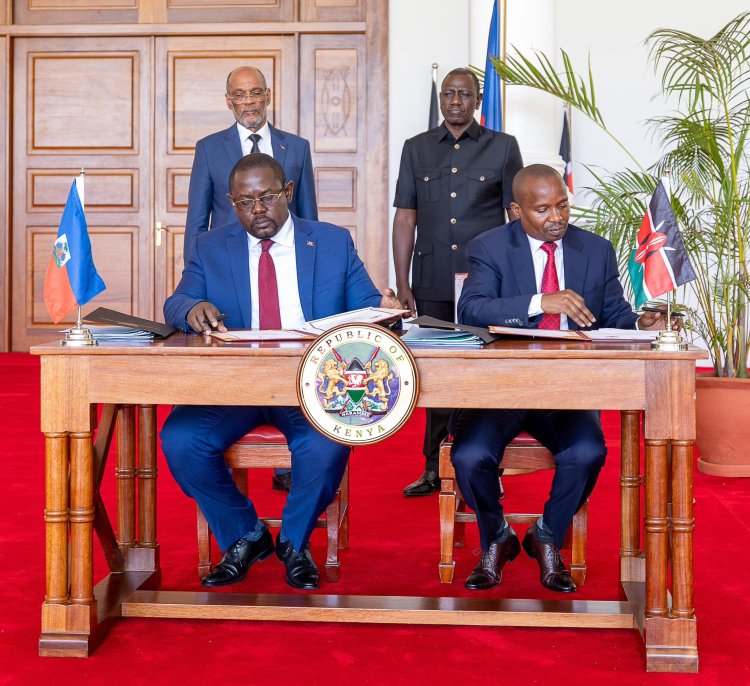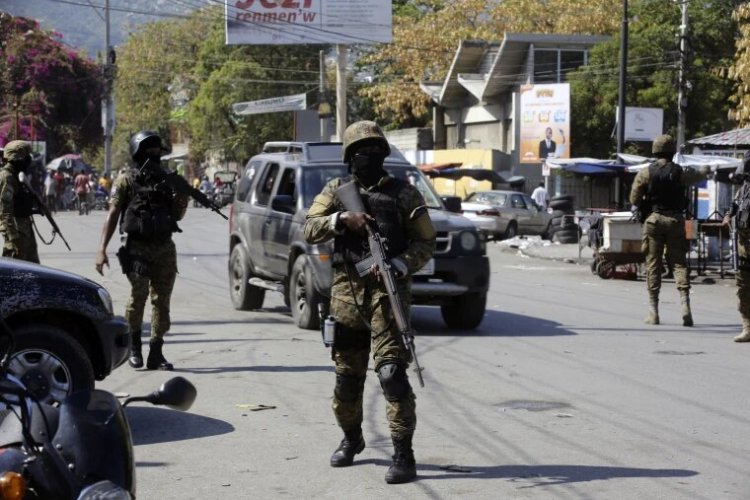We Are Almost Ready- CS Kindiki On Kenya Police Deployment To Haiti
Kindiki indicated that all frameworks including the law of detention, arrest, and standard operation procedures have been finalized

Interior Cabinet Secretary Kithure Kindiki has announced that the deployment of Kenya police officers to Haiti is in the pre-deployment phase.
Speaking on Monday, March 11, Kindiki indicated that all frameworks including the law of detention, arrest, and standard operation procedures have been finalized following the resolution of a court order that had blocked the planned deployment.
One of the reasons the High Court of Kenya on Friday, January 26 declared the deployment of Kenya Police to Haiti illegal was the lack of a reciprocal framework to allow the Kenyan police operation in Haiti.

President William Ruto (far right), and Haiti Prime Minister Ariel Henry (far left) witnessed the signing of the agreement on the deployment of 1,000 police officers to Haiti. /PHOTO
"There was a small court matter (which) has been resolved. The court said we needed to have a reciprocal agreement with Haiti. That reciprocal agreement has already been signed about a week ago. We are now in the pre-deployment stage.
"All the other programmes are in place including the status of forces agreement and the laws on detention, arrests and other enforcement measures. The standard operation procedures are in place," Kindiki stated.
The CS defended the planned deployment, which has been met with intense criticism from a section of Kenyans, considering the gravity of the situation in the Caribbean nation that the officers would face should they be successfully deployed.
“Kenyan police officers will just be part of the multinational security mission in Haiti, Kenya is the lead nation but there are so many other countries that have pledged to contribute troops and this came from the mandate of the United Nations (UN) Security Council so it’s part of our international obligations,” Kindiki added.
On Monday, Azimio la Umoja - One Kenya coalition spokesperson Makau Mutua opposed the move saying the officers deployed should have been from the United States of America (USA) as the nation was more familiar with the Carribean country's geographics and even the language.
He added that the US should have also been included given that it is partially responsible for Haiti's intractable problems and that the disturbed country needs transformation rather than policing to solve its internal problems.
Mutua also claimed that Kenya was ill-prepared for such a volatile mission and given the escalating violence, he feared that the country could lose a high number of police officers in Haiti.
"I agree that Africa, including Kenya, needs to help Haiti restore a functional state. But America, the mightiest state in the history of the world, sits next to Haiti. It knows Haiti well. And it’s partially responsible for Haiti’s intractable problems. It hosts Haiti’s largest diaspora, and therefore knows Haiti very well, including Creole, the language," Mutua stated.
"In total contrast, Kenyans know next to nothing about Haiti, not even the language. Kenya is biting more than it can chew by offering to lead the multinational force to Haiti. Kenya’s police have many challenges, including a lack of adequate training and ethics. They will be sitting ducks in Haiti. Many may come back in bodybags given the viciousness of Haiti’s notorious and extremely well-armed gangs which control 90% of the country."
Over the weekend, the violence in the capital Port-au-Prince ramped up once again. Heavily armed gangs attacked the National Palace and set part of the Interior Ministry on fire with petrol bombs.
It came after a sustained attack on the international airport, which remains closed to all flights - including one carrying Prime Minister Ariel Henry.
He tried to fly back to Haiti from the United States last week, but his plane was refused permission to land. He was then turned away from the neighbouring Dominican Republic too, with BBC reporting that Henry is now stuck in Puerto Rico, unable to set foot in the nation he ostensibly leads.
Among those who did manage to get into the stricken Caribbean nation, though, was a group of US military personnel.
Following a request from the US State Department, the Pentagon confirmed it had carried out an operation to, as it put it, "augment the security" of the US embassy in Port-au-Prince and airlift all non-essential staff to safety.
Soon after, the European Union (EU) said it had evacuated all of its diplomats, fleeing a nation mired in violence and facing its biggest humanitarian crisis since the 2010 earthquake.







